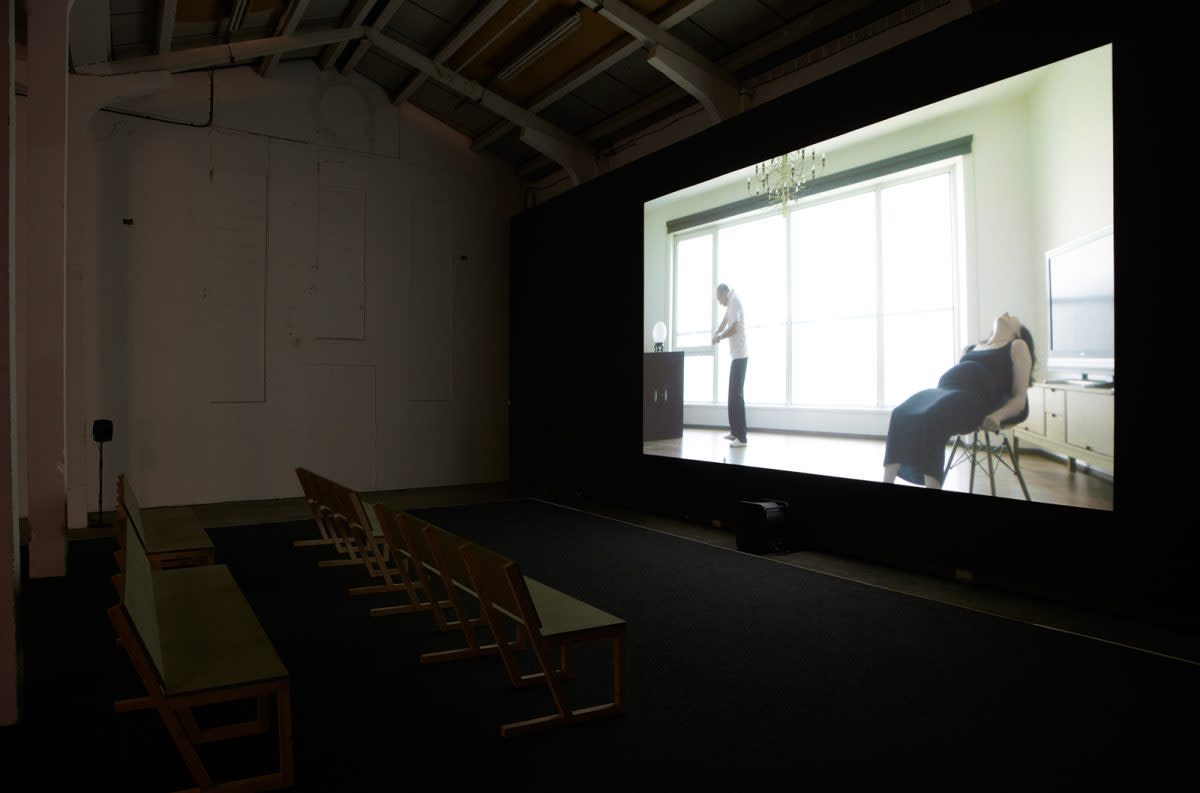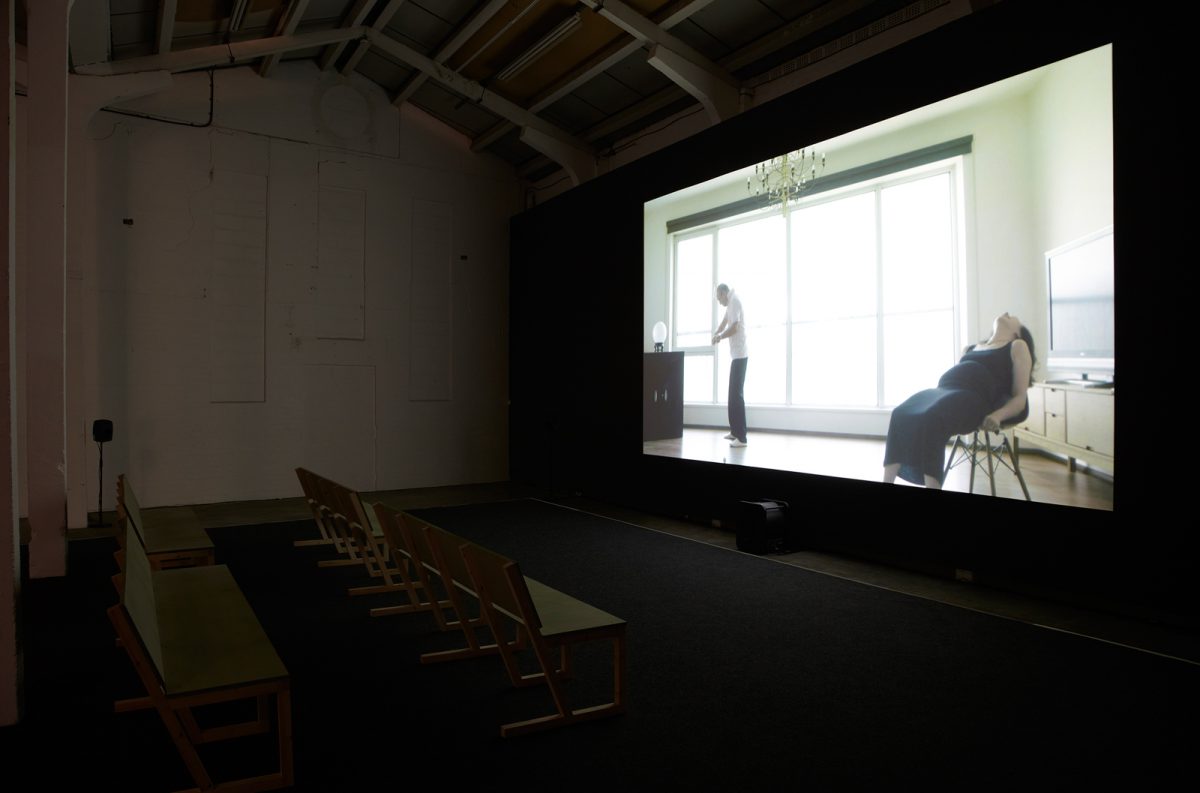Exo-Communications
Frédéric Neyrat
Other languages: Français, Italiano
All property is loss because all property is the loss of sharing. —Fred Moten and Stefano Harney, All Incomplete
“This is me”
Here is the opening paragraph of Fred Moten and Stefano Harney’s 2021 book, All Incomplete, which launches a radical new attack on the notion of property:
The first theft shows up as rightful ownership. This is the theft of fleshly, earth(l)y life, which is then incarcerated in the body. But the body, it turns out, is just the first principal-agent problem. The body is just an overseer, a factor, a superintendent for the real landlord, the real owner, the individual, in his noxious, heavy-handed conceptuality. The legal term for this principal-agent problem is mind. In this regard, the designation “mind/body problem” is a synecdochal redundancy in abstraction rather than an entanglement, or even an opposition, of anima and matter, mama and soul.1
What is decisive is that, with Moten and Harney, one may say (détourning Rousseau) that, “the first man, who after enclosing a piece of ground, to whom it occurred to say, this is me” (and not, as in Rousseau, “this is mine”) “and found people sufficiently simple to believe him, was the true founder of modern society.”2 Except that, in this case, the belief had its origins not in a simplicity of spirit but in colonial violence. In the vault of time that constitutes the statement "this is me," there resounds the muffled yet reverberating cry of a community, a communication in search of its outside.
Refusing the self that has been refused
The modern individual was founded through the use of colonial violence to appropriate a space-time that was declared to be empty, a terra nullius. Territorial expropriation presupposes that beings have been expropriated of any right to become individuals: certain beings are denied the interiority that the subject-owner has created for himself by appropriating a space-time. Black people will consequently be considered not as persons or subjects like the White people but like non-individuals, non-selves, or "sub-subjects,” as the original text puts it (15).
We therefore understand why Moten and Harney are unable to take over the motif of a defense of interiority or a "the care of the self" (Foucault), at least, if the latter does not begin by questioning the very notion of the self and its fraudulent interiority. To fight for inclusion within society and its institutions for those to whom individuality, subjectivity, selfhood have been refused is a surefire way to maintain the schema of the self-founded-on-the-non-self, of a subject whose emergence belongs to the residue of colonialism’s ontological expropriation. On the other hand, if it is possible to take back one's due in this way, to reclaim even a tiny bit of what has been stolen from you, then sure, inclusivity, why not? But the latter would remain a purely tactical inclusivity, which should in no way be understood as offering a political solution, since the fundamental position defended by Harney and Moten consists first and foremost in refusing the self that has been refused.


To refuse the self that has been refused cannot therefore mean to become a free subject, at least, if the liberation of the subject would entail reiterating the onto-psychic structure of the originary theft of modernity. (On this point, allow us to specify that Foucault himself is somewhat clearer than is suggested by Harney and Moten's book, when he writes that the real problem of contemporary politics is not “to liberate the individual from the state and from the state’s institutions,” but to “liberate us both from the state and from the type of individualization that is linked to the state.”3) Politics must find its point of departure in that which we suppose to take place beneath the subject, in the sub of the sub-ject, in the “undercommons”: a form of sharing [partage] that binds the collective in fugitivity and dispersion, a diffuse affinity that binds in separation (123).
Complicity, strategy, improvisation (undercommons)
The problem with the idea of the commons (of goods held in common), Moten and Harney tell us, is that it presupposes subjects who inter-act, who create and share relations between themselves, whereas the existence of a commons depends upon there being a substrate of body-minds already shared, used, exploited, intra-acted by forces that have tried by all possible means to ensure that there nothing (or nothing at all) that obtains between them.
The "undercommons" is situated beneath such individuals-in-relation, at a level where what lives does not terminate in any subject or unity, where incompleteness and impropriety are shared without becoming a type of object that one could sell or exchange: incomplete, all incomplete are those who can exist with those who refuse the closure of the self. This undercommunism, fully actual in the forms of life that compose it, yet fiercely virtual in the sense that it need not be actualized by full subjects, brings a certain form of "complicity" into circulation: the fact of acting within an institution for something that outstrips it. After all, it is by constantly trying to avoid compromising ourselves, by doing our job while still hoping to save our souls, for example when one engages in the act of teaching (or of caring) as if it were an island of time removed from neoliberalism, that we lose track of ourselves and reiterate patterns of exploitation. The institution is well aware of our torments, and it is thanks to these inner torments that we do our jobs so well, that we will do anything in our power to remain morally irreproachable, to not transgress boundaries, to divert our mind.


It is from complicities, therefore, that we must begin, with the articulations that they enable between the inside of the institution and its outside. Only in this way can we avoid the traps of strategy, which all boil down to rationalizations of impossible situations thrown up before us, ways of enjoining us to produce ourselves as a subject within their differences. Perhaps we ought also to experiment with what happens when the "speed of improvisation" (116) dissolves and reinscribes strategy entirely otherwise, no longer as stratum but as comet; not as "extended thing" (stratum) but as surrection; not as the accumulation of power but as a fugitive elaboration; not a theater of operations but a Quartet for the Origin of Time, an orchestra under the improvised "conduction" of Lawrence D. "Butch" Morris.
To avoid any ambiguity about the term, it must be added that for Moten improvisation is always "improvisation of improvisation," which is to say, not a pure presence hurled without foresight into action, but what gives itself in the moment both as prophecy (to this belongs all that I proclaim in haste, all that I do without having the time to verify it precisely because it can only present itself over the course of time to come) and as the resumption of previous improvisations (there have been precedents, a history, archives reopened urgently), where absence itself is summoned into the act.4
Exo-communism, exo-communications
Moten and Harney are right to claim that "non-fascist living is a refusal of communism" (126) — that is, so long as non-fascism consists in promoting the form of life of the liberal individual who believes it’s enough to simply avoid getting one’s hands dirty while defending the purity of reason, mastery over the affects, and moderation as a reply to the fascist "hordes" (whereas the latter know quite well how to think and make use of affects).
However, the critique of the individual as the primordial and recurrent theft of community, crucial as this is, does not seem to me to be precisely calibrated to our contemporary situation. For capitalism today is "recombinant" (Franco Berardi)5, and no longer takes as its primary target the individual, but rather 1) slices of individuals, dividual elements that it then reassembles at a later moment, and, where necessary, under the form of the transitory individual, an actualization of previously digitized psychological realities polarized according to the solicitations of purchase histories, elections, prophylactics, and pornographic ads assembled by bots and market algorithms, etc., and 2) trans-individual lines that are exploited and redistributed under dividual forms, themselves reformatted where necessary at the individual or pseudo-collective level. In short, when capitalism becomes recombinant, when it takes control of the processes of virtualization and actualization, what we are robbed of is our very capacity to synthesize as such: it is as if digital capitalism were attempting to conquer our a priori capacity to synthesize. This certainly does not mean that it has fully succeeded in doing so, that our transcendental schematism is purely and totally empirical-technical, but simply that it is making a violent attempt to do so.


I fear, therefore, that a simple refusal of the individual-owner misses the way in which communication technologies, the forms of digitalization to which our reality is presently subjected, along with the systems of controlled access thereof, etc., have to a large extent already repudiated the concept of interiority: the "I" of today’s social networks is less the index of an interior property than the expression and condensation of opinions that, first accumulated in the digital world, only later find an occasion to discharge themselves in reality.
It therefore seems necessary to think along two levels at once: 1) on the one hand, we must refuse the self produced by spoliation, and therefore posit sharing as an element of dissolution of individuality within the undercommons; 2) but it is no less important to consider what there is of the non-self in the self, that zone of opacity that, in my view, remains irreducible to the interiority of the individual-owner. This zone of opacity belongs to that outside that Deleuze describes as deeper and more interior than any interiority, and which demands that we rethink the very idea of the subject itself, which henceforth must be understood as a fold that the inside introduces within the space of the outside: the subject not as interiority but as "a derivative of the outside.”6 This zone of opacity is that which refuses every grasp [prise], wherever it comes from — an unsharable and non-exchangeable dimension that cuts across existence and nourishes a kind of exo-communism, an ex-communication that addresses itself neither to individuals, nor to a community, but only to the unpredictable correspondences between one person and another, the human or inhuman otherness. Such a zone of opacity therefore does not reinstall the individual or any form of closed interiority, but instead serves as the condition of possibility of a dialectic, a communication without confusion between the shared and the unshared, the finite and the infinite, what transpires beneath the subject and all that overflows it in the form of supra-subjects or those event-like superjects Whitehead spoke of, or cosmo-jects in contact with the entire universe. It is only from within such a dialectic that the possibility presents itself of reappropriating the use and ends of our capacity for transcendental synthesis.
The dismantling of the world and planet Earth
It is by taking into account the inhuman, the opacity of planetary asubjectivity, the cosmological outside that cuts across the terrestrial inside that we can properly rectify the "Earth’s procession" (113) and dismantle the world that presently seeks to suffocate the Earth in its flames. It is true that we must learn to improvise, because although fascist becomings and ecological decay press upon us from all sides, the form they take is often unpredictable. But we also must win, even if this is impossible: we have an obligation to win, and the ex-communications that issue either from our decisions or from our tastes must proliferate, on our terms and never on those of our enemies. To ex-communicate means never to demonstrate [manifester] at the same time and in the same place as those with whom we ought never become friends anyway. It means engendering space-times in which we could be victorious, a space-time of ex-communications, of communications out of control, out of common, out of self — prophetic space-time that is also prior to time, in which it can be said and heard:
“And when we win, blackness will rain in sun showers while the time disappears” (121).
September 2021
Translated by Eli Simmer
Images: Cao Fei
Notes
1. Stefano Harney and Fred Moten, All Incomplete, Minor Compositions, 2021, 13. ↰
2. “The first man who, having enclosed a piece of ground, to whom it occurred to say this is mine and found people sufficiently simple to believe him, was the true founder of civil society. How many crimes, wars, murders, how many miseries and horrors manking would have been spared by him who, pulling up the stakes or filling in the ditch had cried out to his kind: Beware of listening to this impostor; You are lost if you forget that the fruits are everyone’s, and the earth no one’s” See Jean-Jacques Rousseau, The Discourses and Other Early Political Writings, Cambridge, 1997, 164.↰
3. Michel Foucault, “The Subject and Power” in Critical Inquiry, Vol. 8, No. 4 (Summer, 1982), 777-795.↰
4. Fred Moten, In the Break: The Aesthetics of the Black Radical Tradition, University of Minnesota, 2003, 63–64.↰
5. For instance, see Franco ‘Bifo’ Berardi, “What is the Meaning of Autonomy Today?,” Transform, March 2003. Online here. ↰
6. Gilles Deleuze, Foucault, trans. Seán Hand, University of Minnesota, 1986, 106.↰